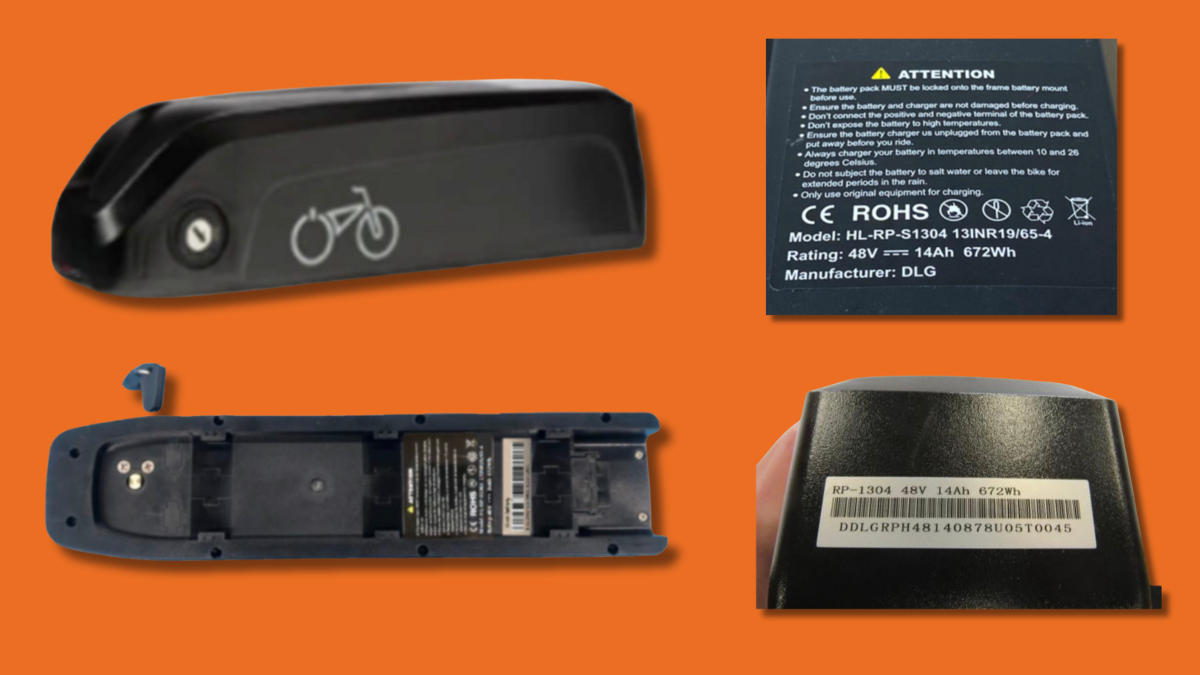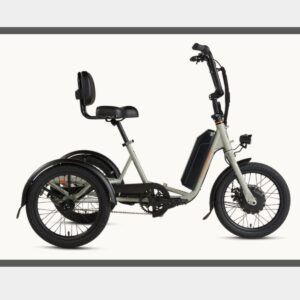Seattle-based e-bike company Rad Power Bikes is the subject of a serious warning issued Monday by the U.S. Consumer Product Safety Commission (CPSC). Rad Power has issued their own statement that “strongly disagrees” with the government statement. Rad Power is one of the largest e-bike brands in North America with thousands of customers in the Portland region. Note this is a warning and not a recall. The CPSC says they tried to perform a recall, but Rad Power has “refused to agree to an acceptable recall.”
In a press release, the CPSC said people who own certain models of Rad Power batteries should, “immediately” stop using them, “because the batteries pose a risk of serious injury and death.” The specific battery model numbers are; RP-1304 and HL-RP-S1304.
Here’s more from the CPSC:
“The hazardous batteries can unexpectedly ignite and explode, posing a fire hazard to consumers, especially when the battery or the harness has been exposed to water and debris. CPSC is aware of 31 reports of fire, including 12 reports of property damage totaling approximately $734,500. Some of these incidents occurred when the battery was not charging, the product was not in use, and the product was in storage.
The batteries were sold with the following Rad Power Bikes e-bike models and as replacement batteries: RadWagon 4, RadCity HS 4, RadRover High Step 5, RadCity Step Thru 3, RadRover Step Thru 1, RadRunner 2, RadRunner 1, RadRunner Plus, and RadExpand 5. The battery model number (HL-RP-S1304 or RP-1304) is printed on a label on the back or rear of the battery. The batteries were sold on RadPowerBikes.com and at Best Buy stores and independent bike shops nationwide for about $550 (replacement batteries) or between $1,500 and $2,000 (when sold with e-bikes).”
The CPSC says if you have one of these batteries you should remove it from the bike and dispose of the battery in accordance with local hazardous waste procedures. The CPSC says Rad Power has refused to agree to acceptable recall mitigations and that “given its financial situation, Rad Power Bikes… is unable to offer replacement batteries or refunds to all consumers.” Just two weeks ago, news reports detailed that Rad Power could be forced to shut down in January if they were unable to secure new funding and ownership. Read the full CPSC recall notice here.
In response to the warning, Rad Power says they stand behind their batteries and, “strongly disagrees with the CPSC’s characterization of certain Rad batteries as defective or unsafe.” “Reputable, independent third-party labs tested Rad’s batteries, both as part of our typical product testing and again during the CPSC investigation,” the statement continues, “and confirmed compliance with the highest industry standards. Our understanding is that the CPSC does not dispute the conclusions of these tests. It is also our understanding that the battery itself was not independently examined per industry-accepted test standards.”
Rad Power claims that the CPSC has taken battery issues out of context. “The incident rate associated with the batteries in the CPSC’s notice is a fraction of one percent,” Rad Power says. The company goes on to explain that e-bike batteries post inherent risks when not stored or used properly. Read Rad Power’s full statement, here.
Risks of e-bike battery explosions and fires have simmering in the bike industry for years — but nearly all publicized cases have happened to lower-priced batteries from unregulated manufacturers. Even so, I know of at least one local e-bike shop that has very meticulous battery storage methods, including a fireproof metal locker placed outside their retail building.
Asked for battery safety advice, The eBike Store shared the tips below:
- Look for UL approval.
- Only charge battery when it’s at room temp.
- Don’t charge unattended.
- Don’t leave battery plugged into charger indefinitely.
- Try to keep between 20-80% charge when possible.
- Don’t drop it.
- Don’t use an aftermarket or unapproved charger.
- After a crash or drop, let the battery sit for seven days in a non-flammable area.
Stay tuned for more coverage.








Thanks for reading.
BikePortland has served this community with independent community journalism since 2005. We rely on subscriptions from readers like you to survive. Your financial support is vital in keeping this valuable resource alive and well.
Please subscribe today to strengthen and expand our work.
Does anyone know if these vehicles are ridable without the motor? Given that you can hear the tire noise a block away, I’m guessing “technically, yes”.
Depends on which model, but they are all very heavy. At least one of them is ergonically inconvenient to pedal.
I have a RadCity, and I have ridden it with the assist turned off for many miles. It’s heavy and there is a bit of drag, but manageable. If you removed the battery and replaced the back wheel with a non-motorized wheel, it should ride like a normal bike.
Good for you but I think l’ll pass on that option. Prefer my pedal bike designed for pedaling.
I don’t think this was a recommendation. Just a bit of information.
I’m on my second ebike – both are/were heavy with a similar 1×10 Deore-level parts mix. My first was a 57-lb HEAD that when I rode with the engine off, it had the same speedy ride as a beach cruiser on loose beach sand – extremely slow, lots of resistance – I abandoned the bike after the aluminum frame cracked at the seat collar. My current ebike is a 75+lb steel Surly Skid Loader with a Bosch cargo motor, very high torque – with the engine off, which I usually do for our monthly slow Critical Mass rides, it still rides fine, even uphill – it’s not speedy, but it’s still very efficient, not at all hard to ride. Both bikes got 50-60 miles on a full charge.
I’ve had a dead battery on my roadrunner and it was easier to walk it than try to ride it
Bankruptcy coming in 3, 2, 1, …
They have already laid off staff and said warned they may be shutting down in January.
https://myeverettnews.com/2021/07/13/rad-power-bikes-uses-port-of-everett-to-solve-shipping-delays/
I remember when they did this in 2021 when it was impossible to get product in due to logistics nightmares everywhere you looked. Just buy an insane number of containers and send a privately chartered container ship. Normal bike business stuff!
Reminds me of the scene from “I, Robot”, there’s always going to be some risk associated with storing that much energy in one place, but it’s going to take some time to catch up with safety protocols like how we handle gasoline.
https://www.youtube.com/watch?v=4NAU-UyiJ8A
Exploding e-waste.
That’s all I see when I look at a cheap e-bike.
$1800 is cheap? it must be nice to be rich…
Relatively speaking, it is cheap. You don’t want to know what I’ve sunk into bikes that don’t even have motors. If you’re car-free, you could drop a few multiples of this on a bike and come out way ahead.
All things considered, even bikes in the $10k range are cheaper than children. So maybe car-driving parents are the rich ones you should be directing this comment toward.
But yes, it’s nice to be rich too, of course.
One piece of advice I got from one of my bikiest sources before buying an e-bike was to go for a “standard” battery rather than one proprietary to the bike manufacturer. It was easy to take this advice to heart, as someone I know had recently plunked down thousands of dollars for a fancy-shmancy European e-bike with a proprietary system, from a company that went bankrupt *weeks* after my friend’s bike arrived, rendering the bike unusable. It’s still sitting in his basement years later! When I bought my e-bike from the wonderful folks at Splendid Cycle, we discussed exactly what parts were proprietary, and everything they said reassured me that if the bicycle manufacturer went out of business, I could still get the battery or other parts replaced as needed. Two years and nearly 5,000 miles later, it hasn’t been an issue, but I don’t think I’d buy or recommend a friend buy a bike with a proprietary battery. (Lucky for me, I don’t have to shop for an automobile … even more proprietary bits n pieces on those.)
Finding spare parts for a car is generally easier than for an e-bike. Car manufacturers are required to stock parts for a fixed amount of time, and, in many cases, third party parts suppliers make compatible parts. There is also a strong second-hand parts market for many car models.
Not so much with newer cars though. It’s all built as proprietary modules that are glued together. Window motor broke? Congrats, you’re replacing your entire door!
Depends on the vehicle. I imagine that is a bigger issue with luxury brands and e-cars, but my relatively new F150 is very similar to my old one when it comes to part availability and repairs. You do need to have some more advanced diagnostic tools like OBD read/write devices and a good multimeter.
Bosch and Shimano motor/battery systems for the win.
you mean for the rich
Integrated mid drives look expensive but their complexity has resulted in having two designs that will establish a standard for manufacturers and frame builders. The cost of the drive will go down with volume and refinement of the design, and there will be multiple price points.
Cars have much greater complexity than bikes and failures that cost $1000 or more are commonplace in the life of a car. For some reason we don’t think that cars are just for rich people. I guess that before long we’ll see mid drive e bikes creeping down into the price range of a transmission repair or perhaps a mid oughts Subaru oil leak blessing and healing.
I was neurotic about making sure I got an ebike that was as repairable as possible. All the bike stuff is big standard and can be fixed by any bike shop. The battery and motor are Bosch and given how much shit Bosch makes I figure the going out of business would be akin to Honda going out of business.
To my knowledge there is no such thing as an “industry standard” battery for ebikes. Some may be more common than others, but they are not like AA batteries.
When news of ebike battery fires started popping up a few years ago, I saw advice to only buy an ebike if it came with a battery that was UL certified. I don’t see that icon on the battery, but does anyone know for sure if Rad has pursued that certification or not?
I think it depends on which model you have and when you bought it Joan. Rad has a post on their website from June of 2024 discussing that they had gotten UL certification for Radster Road, Radster Trail, RadWagon 5 and RadExpand 5 Plus. The same article notes that all Rad ebikes are either UL Certified or ACT compliant. I would expect any battery that had been certified by the UL to have a sticker on it indicating that it had passed as seen here in this image.
Yes, Rad eventually started selling “Safe Shield” batteries that were UL certified. The batteries that CPSC is warning about are older, from before they rolled those out.
My advice is to only buy battery-powered bikes from bike companies that have been making regular bicycles for a very long time. From what I’ve seen, the cheap e-bike-only (e.g., Rad Power) companies clearly know or care little about good geometry, especially for bikes intended to carry loads.
Good geometry matters much less for bikes not intended to be pedaled more than a token amount.
I disagree. Handling characteristics become more important when carrying load loads and traveling quickly.
I disagree, big manufacturers can afford to develop proprietary systems and then decide they don’t want to be in the market and those service parts are gone.
A bit of a digression but safety markings are something that people broadly don’t understand well.
In my experience UL is a good company that does good work. However, it has never sat right with me that single private company sets the standards, tests to the standards, certifies to the standards AND that consumers broadly do not know that there are alternate equivalent marks.
When consumers are taught to look for the UL mark specifically it really ties the manufacturers hand as to which test lab to use. This reinforces a monopolistic situation.
I too was curious if the problematic batteries had UL marks. Understanding now that they didn’t have UL marks, I’m wondering if they had any marks from any other NRTLs.
If you’re concerned about your e-bike battery (recall or not) fire proof bags are relatively inexpensive. I don’t know where you can find one locally but I bought one online after inheriting a DIY e-bike.
I’m sure Nomad Cycles could easily build and sell people replacements, given the Bafang motors on Rad Power machines are ubiquitous.
Will PCEF slush fund free e-bike plan help more folks get e-bikes? Sure. If they don’t just sell them off to the privileged (think Bike Portland readers). If not, will the batteries stay intact long enough for them to enjoy the ride? That’s between the less fortunate and the fire gods. And should taxpayers also be kicking in for fireproof bunkers or will the PCEF $$ disproportionately put POC at risk? That would be ironic. Stay tuned.
https://bikeportland.org/2025/09/25/portlands-long-awaited-e-bike-rebate-program-to-soft-launch-monday-397071
“According to the City of Portland, the soft launch will target Portland Community College students who will be eligible for a $1,900 rebate. The rebate is split between $1,600 off a “standard Class 1 e-bike” and $300 for “essential bike accessories” (helmet, lock, lights, and so on).”
Right. So wildly impractical for something that is supposed to be every day transportation.
It’s December in Portland and you’ve just ridden your e-bike home from work. You need to bring it into a “room temperature” space and let the battery soak the heat for 4 to 6 hours. Okay. Now you can start charging. It’ll take 4 hours to charge, so you better queue up a few movies and make sure you don’t leave the room.
Are they serious?
You can spend that time waterproofing your jacket.
Batteries are pretty easily removable, if I understand correctly.
I remove my partner’s e-bike battery every autumn and it takes me 5 minutes to find the key and 30 sec to remove the battery.
How hard can this be–since we’re talking about electrical devices replete with sensors and processing power, the battery could have a small resistance heater that comes on when the charger is plugged in and keeps the battery in the desired temperature range until charging is complete. If over temperature is detected the charger service breaker trips and it starts beeping.
I read up on the Radbikes troubles (brakes, front quick release, now potentiallly batteries) and became even more thankful for Barb and Joel at Splendid Cycles. They know e-bikes and cargo bikes! I bought my cargo e-bike from them and LOVE it. I just had my bike serviced and they were so good to me. I would not recommend a DTC e-bike purchase. I have become skeptical of e-bike conversions. That’s what I get for being the daughter of a physicist, lol.
It really is impossible to recommend Splendid Cycles enough, the best customer service I have received at any business in Portland.
Hi-Power Cycles in Simi Valley, California makes reliable and great e-bike kits.
I never have to worry about any of my bicycles exploding in my garage. One more reason to not buy a moped.
Thank you for sharing our eBike Store safety protocols. We consider these to be firm, essential guidelines that will help keep you safe and extend the life of your eBike battery.
My e-bike takes 5 hours to charge. Do I need to structure my evenings around charging so I can ensure it remains attended the entire time? The battery cannot be removed, and I park the bike outside. How do I charge at room temperature?
Sadly Lithium Ion batteries do react best when not charged in extreme temperatures ( both Heat & Cold ). While I understand it is a hassle to bring the bike in and out to do said charging, it is just a guideline to get the best life out of you eBikes Battery ( and this is true of all Lithium Ion batteries, phones, laptops, etc ). You could always contact your eBikes manufacturer and see what they advise as well.
I’m not saying either Rad or the CPSC are correct, but when it comes to the CPSC I’m somewhat hesitant to believe them at face value. Maybe things have changed since this video (https://youtu.be/uLwR81UyceE?si=mTIgLgkB8vFEyWTT) was made, but I hav doubts. Overall, I’m concerned about what sort of decisions they could make regarding ebikes, which definitely need good regulation.